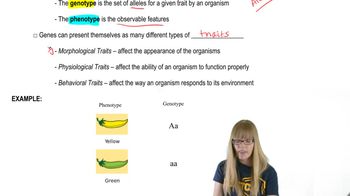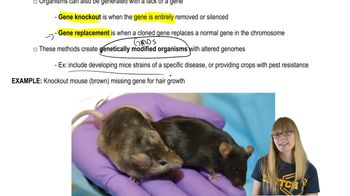Table of contents
- 1. Introduction to Genetics51m
- 2. Mendel's Laws of Inheritance3h 37m
- 3. Extensions to Mendelian Inheritance2h 41m
- 4. Genetic Mapping and Linkage2h 28m
- 5. Genetics of Bacteria and Viruses1h 21m
- 6. Chromosomal Variation1h 48m
- 7. DNA and Chromosome Structure56m
- 8. DNA Replication1h 10m
- 9. Mitosis and Meiosis1h 34m
- 10. Transcription1h 0m
- 11. Translation58m
- 12. Gene Regulation in Prokaryotes1h 19m
- 13. Gene Regulation in Eukaryotes44m
- 14. Genetic Control of Development44m
- 15. Genomes and Genomics1h 50m
- 16. Transposable Elements47m
- 17. Mutation, Repair, and Recombination1h 6m
- 18. Molecular Genetic Tools19m
- 19. Cancer Genetics29m
- 20. Quantitative Genetics1h 26m
- 21. Population Genetics50m
- 22. Evolutionary Genetics29m
22. Evolutionary Genetics
Overview of Evolution
Problem 24
Textbook Question
Some critics have warned that the use of gene therapy to correct genetic disorders will affect the course of human evolution. Evaluate this criticism in light of what you know about population genetics and evolution, distinguishing between somatic gene therapy and germ-line gene therapy.
 Verified step by step guidance
Verified step by step guidance1
Understand the difference between somatic and germ-line gene therapy: Somatic gene therapy involves altering genes in specific tissues of an individual, without affecting the individual's germ cells (sperm or eggs), while germ-line gene therapy involves changes to the germ cells, which can be passed on to future generations.
Consider the impact of somatic gene therapy on evolution: Since somatic gene therapy does not affect germ cells, it does not directly influence the genetic makeup of future generations and therefore has minimal impact on human evolution.
Evaluate the potential evolutionary impact of germ-line gene therapy: Germ-line gene therapy can introduce changes that are heritable, potentially affecting the genetic diversity and evolutionary trajectory of human populations.
Discuss the role of natural selection and genetic diversity: In population genetics, natural selection acts on genetic variation within a population. Germ-line gene therapy could reduce genetic diversity if it leads to widespread adoption of certain genetic traits, potentially affecting the population's ability to adapt to environmental changes.
Consider ethical and societal implications: The use of germ-line gene therapy raises ethical concerns about 'designer babies' and the potential for unintended consequences, which could influence public perception and regulatory policies, ultimately affecting its impact on human evolution.
Recommended similar problem, with video answer:
 Verified Solution
Verified SolutionThis video solution was recommended by our tutors as helpful for the problem above
Video duration:
2mPlay a video:
Was this helpful?
Key Concepts
Here are the essential concepts you must grasp in order to answer the question correctly.
Population Genetics
Population genetics is the study of genetic variation within populations and involves the examination of allele frequency changes under the influence of evolutionary processes such as natural selection, genetic drift, and gene flow. Understanding population genetics is crucial for evaluating how gene therapy might impact genetic diversity and evolutionary trajectories in human populations.
Recommended video:
Guided course

Descriptive Genetics
Somatic vs. Germ-Line Gene Therapy
Somatic gene therapy involves altering the genes in somatic (non-reproductive) cells, affecting only the individual treated and not passed to future generations. In contrast, germ-line gene therapy modifies the genes in germ cells (sperm or eggs), which can be inherited by offspring. This distinction is vital for assessing the long-term evolutionary implications of gene therapy on human populations.
Recommended video:
Guided course

Transgenic Organisms and Gene Therapy
Evolutionary Impact of Gene Therapy
The evolutionary impact of gene therapy refers to how interventions in genetic disorders might influence the genetic makeup of future generations. Critics argue that germ-line modifications could lead to unintended consequences on human evolution, such as altering natural selection pressures. Evaluating these potential impacts requires a deep understanding of evolutionary theory and genetic principles.
Recommended video:
Guided course

Transgenic Organisms and Gene Therapy
Related Videos
Related Practice




